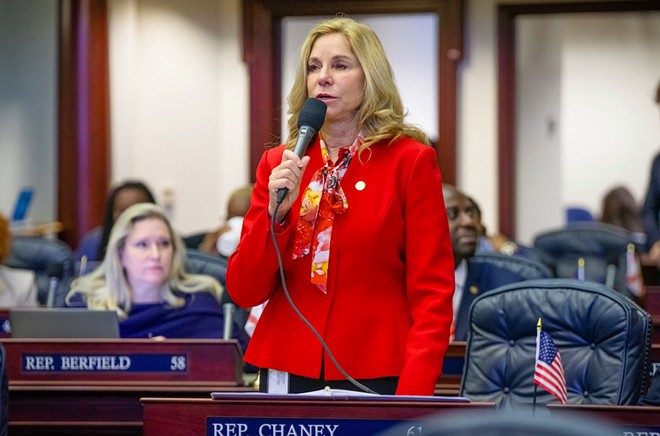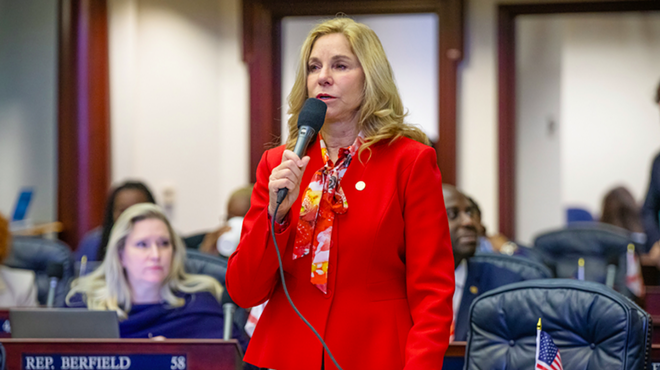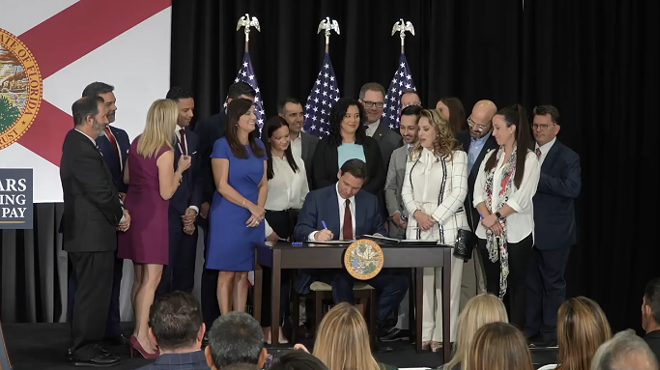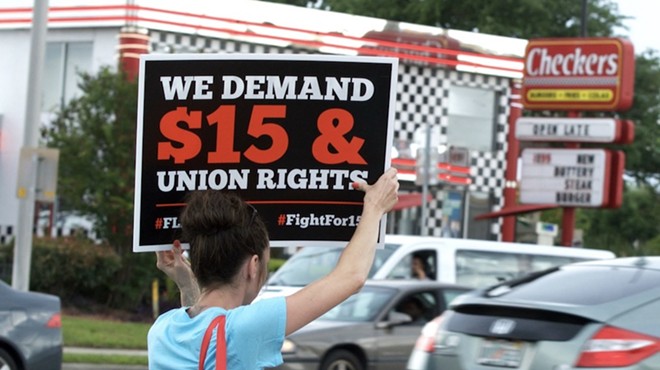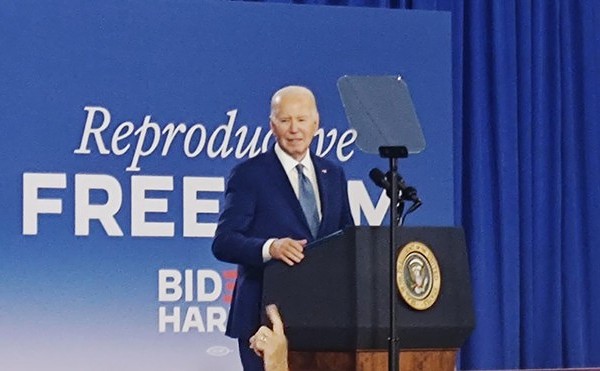A bill filed in September by Florida Republican Linda Chaney, a member of the state House, would undo decades of child labor regulations by loosening restrictions on how late older teens in Florida can work. It would also prevent local governments from passing limitations stricter than the state’s. Its filing complements a growing movement to roll back labor regulations established to protect the health and safety of children.
Labor advocates have suspected that the Foundation for Government Accountability, a Naples-based group that drafted legislation to roll back child labor laws in other states, is behind Chaney's bill.Now, public records originally obtained by More Perfect Union, including emails and text messages, prove it.
Emails show that the Foundation for Government Accountability, a dark money group funded by a bunch of ultra-conservatives and a billionaire mega-donor, doesn’t just support Chaney’s bill, but literally wrote it themselves.They also provided Chaney, a Republican from St. Pete Beach, with talking points to counter the backlash it quickly received. State lawmakers, the majority of whom are Republicans, will consider the bill (HB 49) during an upcoming legislative session that begins Jan. 9, 2024.
Public records show a legislative aide for Chaney began communicating with the Foundation for Government Accountability over email about “Youth Worker Freedom” legislation in late July.
An initial email from the aide shows this communication came at the request of Chaney herself, who instructed her aide to follow up with the FGA about legislation concerning “youth worker freedom.” (Chaney's office did not respond to Orlando Weekly’s request for comment on this story.)
The Naples think tank — and its lobbying arm, the Opportunity Solutions Project — is no stranger to child labor bills. They’ve directly lobbied Republicans in states like Arkansas, Missouri and Iowa to relax regulations on child labor law, explicitly framing it as an opportunity for businesses to address labor shortages.
At least 16 states, including Florida, have introduced legislation to roll back child labor regulations over the last two years, according to the Economic Policy Institute.
Some of the most extreme proposals, like a new bill signed into law in Iowa this year, could allow employers to put minors to work in hazardous jobs, and allow minors to operate heavy machinery like power saws. State Senate Republicans in Iowa worked overnight to push that one through the state legislature, the Associated Press reported, despite concern from Democrats and labor unions that it could harm children. Just two Republicans defied their party to vote against it.
Florida’s bill isn’t quite as extreme (Florida law already bars putting teens to work in dangerous jobs like meatpacking and mining). But, as in Iowa, the Florida-based FGA is invested in the Florida bill regardless.
The Florida bill, if passed, would delete part of state law that says 16-year-olds and 17-year-olds can’t work before 6:30 a.m. or after 11 p.m., or work for more than eight hours when school is scheduled the next day.
While Florida’s bill doesn’t necessarily legalize the practice of giving children power saws for a wage, or putting them to work in slaughterhouses — although existing labor protections haven’t protected kids from that in other states — child experts say putting minors to work for more than 20 hours per week can negatively affect things like academic performance and increase the risk for behavioral problems, like drug use or skipping school.
Florida child labor violations nearly tripled 2019-2022
The timing of the bill isn’t great. According to the U.S. Department of Labor, Florida had 281 child labor violations in 2022, up from 178 in 2021. From 2019 to 2022, child labor violations nearly tripled, from 95 in 2019 to 281 in 2022.
Across the country, child labor violations have soared, attributed to a variety of factors, including labor shortages coming out of the pandemic, an influx of unaccompanied minors coming to the U.S. seeking work, and high inflation pushing more teens into the labor market to support their families, the Washington Post reported.
The number of minors working in violation of child labor law has spiked 88% since 2019, the U.S. Department of Labor found, leading some experts to wonder why state-level legislators are looking to relax protections rather than do more to keep minors safe.
Minors have been found working excessive hours, in violation of federal law, and working in poultry plants and sawmill operations like something out of a Great Depression-era novel. A New York Times investigation published earlier this year revealed a widespread problem of immigrant children as young as 12 years old being illegally employed and exploited in various states, including Florida.
This year alone, over $100,000 in fines have already been issued to Florida businesses — based in the Tampa Bay area to Lake Mary to Jacksonville — on account of child labor law violations, according to the labor department (not the state labor department, mind you — we don’t have one of those, not since legislators dissolved it two decades ago).
Those recent child labor violations in Florida have ranged from working teens past legal work hours to putting teens to work in dangerous jobs, like roofing. One local roofing contractor was fined after a 15-year-old they put to work last year fell 20 feet from a home in Orlando, suffering severe head and spinal injuries.
The Biden administration is working to crack down on child labor violations, but advocates worry that Republicans’ proposed changes to state laws are part of a long-term project to weaken already substandard regulations under the federal Fair Labor Standards Act that are meant to protect minors from hazardous work and exploitation.
State laws deregulating child labor have been backed by business industry groups like chambers of commerce and the National Restaurant Association, a trade group that represents low-wage industry giants like Burger King and McDonald’s (a repeat violator of child labor law), as well as companies like Disney.
Since 2016, the FGA’s Opportunity Solutions Project has hired at least 116 lobbyists across over two dozen states, according to OpenSecrets, a political watchdog group. Lobbying expenditures in Florida alone have topped $500,000.
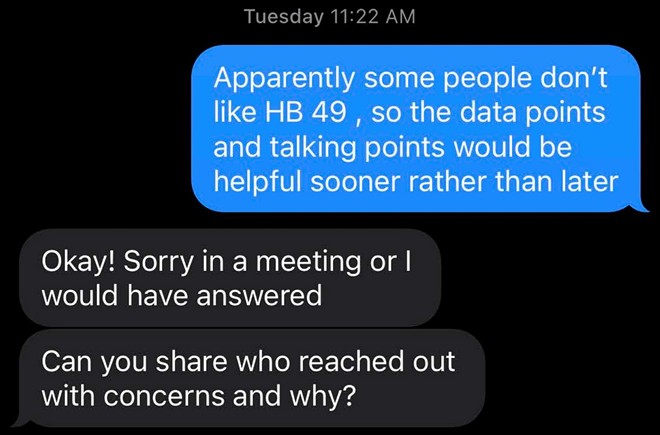
‘Apparently some people don’t like HB 49’
Emails shared with Orlando Weekly show a registered lobbyist for the Florida child labor bill — Anita Berry, of Johnston & Stewart Government Strategies — provided Chaney with draft bill language on behalf of the FGA's Opportunity Solutions Project.
Berry emailed the draft legislation to Chaney’s office in late August, just a few weeks before HB 49 was filed. “Attached is draft language on the Youth Worker Freedom issue that Rep. Chaney expressed interest in to FGA,” Berry wrote to one of Chaney’s aides.
The draft legislation sent to Chaney is nearly identical to the bill as it was originally filed in September. Chaney’s aide emailed Berry back with a lightly edited version just over a week later, on Sept. 8.“Please see attached and let me know of any edits,” the aide wrote. Records do not indicate there were any additional emails exchanged between Berry and the aide prior to Chaney’s filing of the bill on Sept. 18 — at which point a disaster situation quickly ensued.
Less than 24 hours after the lobbyist-approved bill was filed, Chaney’s aide texted Berry in a panic. Media and constituents, he said, were flooding some lawmakers with questions about the “Youth Worker Freedom” bill, which was almost immediately blasted on social media. The aide reached out to Berry for help.“Apparently some people don't like HB 49, so the data points and talking points would be helpful sooner rather than later,” the aide texted.
Berry sympathized. Just a few hours later, she emailed the aide a list of talking points, including a description of how the bill would provide greater “flexibility in work” for teenagers.
“Flexibility to teenagers allows them to learn valuable skills, earn money while assisting small businesses with worker shortages,” the two-page document shares. The document also links to a report from the conservative Manhattan Institute that boasts the “crime-reducing effect” of youth employment. The report specifically looks at the effects of summer job programs for teens in cities like New York City, Chicago, and Boston. It notes they found “limited to no effect” on long-term economic prospects for participants.Neither Chaney nor the FGA Opportunity Solutions Project lobbyist responded to Orlando Weekly’s requests for comment on this story.
No companion bill for HB 49 has yet been filed in the state Senate, although communications between Chaney’s office and Berry floated Republican Sen. Danny Burgess of the Zephyrhills area as a potential Senate sponsor.
“We have been talking to Burgess,” Berry told Chaney’s aide via text.
Burgess’ office did not respond to a request for comment from Orlando Weekly.
Child labor rollbacks aren’t the only thing on FGA’s agenda. The group has also fought efforts to expand Medicaid under provisions of the Affordable Care Act, while supporting efforts to tighten eligibility requirements for food stamps and undermine labor unions.
The group has in the past supported proposals similar to a new union law, reportedly drafted by the anti-union Freedom Foundation organization, that was approved by Florida Republicans and Gov. DeSantis this spring, despite voiced opposition from union members across the political spectrum.
Records obtained by Substack publication Seeking Rents show the FGA sent a series of policy memos on issues such as higher education and housing to staff of Florida Gov. Ron DeSantis last December — the same month that the presidential hopeful spoke at a FGA summit.
Ever connected to the conservative billionaire class, Seeking Rents found that DeSantis has received over $2 million in campaign donations over the last five years from the FGA’s largest funder, Richard "Dick" Uihlein, who contributed $1 million to DeSantis' presidential super-PAC in May.
FGA policy memos sent to DeSantis staff beyond child labor rollbacks included proposals for fighting “woke ideology” and “indoctrination” in universities, as well as proposals that would allow the state to kick low-income people out of public housing after a certain period of time, and tighten eligibility requirements for people on food stamps. The group describes this as a way to “break free from the shackles of government dependency.”
The FGA's latest priority in Florida — the child labor bill — would go into effect July 1, 2024, if passed by the Republican-dominated state legislature.
Chaney, the House bill sponsor, has been relatively quiet about the bill since filing. She told the Orlando Sentinel in a statement last month that the bill “intends to provide teenagers with the flexibility to work whatever hours they deem fits best with their schedule and financial goals.”
Follow us: Apple News | Google News | NewsBreak | Reddit | Instagram | Facebook | Twitter | or sign up for our RSS Feed

